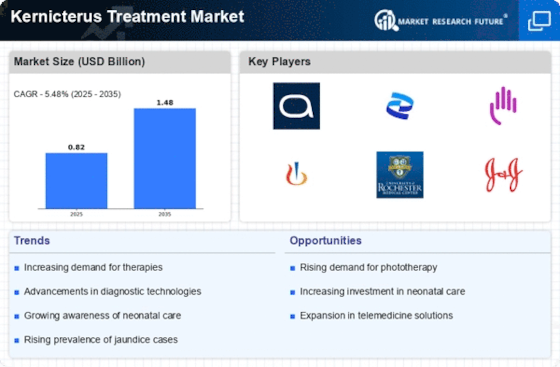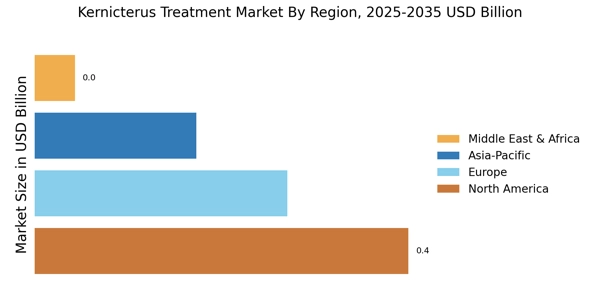Rising Incidence of Kernicterus
The increasing incidence of kernicterus, a severe neurological condition resulting from untreated hyperbilirubinemia, is a primary driver for the Kernicterus Treatment Market. Recent data indicates that approximately 1 in 1,000 live births may develop significant jaundice, leading to kernicterus if not addressed promptly. This rising prevalence necessitates enhanced treatment options and awareness among healthcare providers and parents. As more cases are diagnosed, the demand for effective treatment modalities, including phototherapy and exchange transfusion, is likely to grow. Consequently, healthcare systems are compelled to allocate resources towards the development and implementation of advanced treatment protocols, thereby propelling the Kernicterus Treatment Market forward.
Increased Focus on Neonatal Care
The growing emphasis on neonatal care and the establishment of specialized units for newborns are driving the Kernicterus Treatment Market. Healthcare institutions are increasingly recognizing the importance of early detection and management of jaundice in neonates. This shift is reflected in the rising number of neonatal intensive care units (NICUs) and the implementation of standardized protocols for jaundice management. According to recent statistics, the establishment of NICUs has led to a decrease in kernicterus cases by up to 50% in some regions. As healthcare providers prioritize neonatal health, the demand for effective kernicterus treatments is likely to rise, further propelling the Kernicterus Treatment Market.
Advancements in Medical Technology
Technological innovations in medical devices and treatment methodologies are significantly influencing the Kernicterus Treatment Market. The introduction of sophisticated phototherapy units, which utilize LED technology, has improved treatment efficacy and reduced the duration of therapy required for neonates. Furthermore, the development of non-invasive bilirubin monitoring devices allows for timely intervention, minimizing the risk of kernicterus. These advancements not only enhance patient outcomes but also streamline clinical workflows, making it easier for healthcare providers to manage cases effectively. As technology continues to evolve, the Kernicterus Treatment Market is expected to witness a surge in demand for these innovative solutions, ultimately improving the standard of care for affected infants.
Research and Development Investments
Investments in research and development for kernicterus treatments are significantly shaping the Kernicterus Treatment Market. Pharmaceutical companies and research institutions are focusing on developing novel therapies and improving existing treatment protocols. Recent studies have explored the efficacy of new pharmacological agents that may offer alternatives to traditional treatments. Furthermore, clinical trials are underway to assess the long-term outcomes of various treatment modalities. This influx of research not only enhances the understanding of kernicterus but also drives innovation in treatment options. As R&D efforts continue to grow, the Kernicterus Treatment Market is likely to benefit from a broader range of effective therapies, ultimately improving patient care.
Growing Awareness Among Parents and Healthcare Providers
The heightened awareness regarding kernicterus among parents and healthcare professionals is a crucial driver for the Kernicterus Treatment Market. Educational campaigns and initiatives aimed at informing caregivers about the risks associated with untreated jaundice have led to increased vigilance in monitoring newborns. This awareness has resulted in more timely interventions, thereby reducing the incidence of kernicterus. Additionally, healthcare providers are increasingly trained to recognize the signs of hyperbilirubinemia, leading to improved treatment outcomes. As awareness continues to grow, the demand for effective treatment options in the Kernicterus Treatment Market is expected to expand, fostering a proactive approach to neonatal care.

















